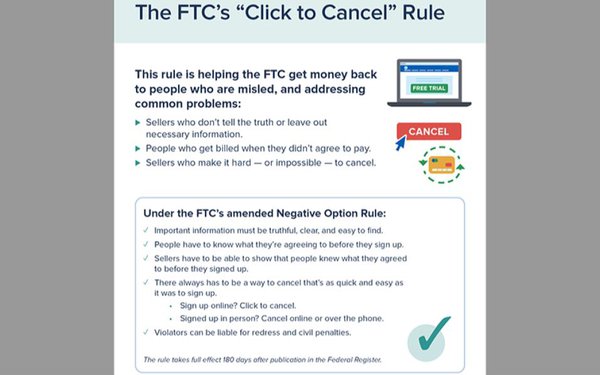
The Federal Trade Commission lacked
authority to issue broad click-to-cancel rules that aim to let consumers easily terminate subscriptions to newspapers, gyms, and other businesses, according to the Interactive Advertising Bureau,
Chamber of Commerce, cable lobby and other organizations.
The groups contend in papers filed this week with the 8th Circuit Court of Appeals that the FTC may only issue rules that
“target well-defined unlawful practices in particular industries,” as opposed to rules "that limit commerce across the economy.”
The organizations are asking the appellate
court to strike down the regulations, which were passed last October in a 3-2 vote. Both Republicans on the commission, including current chair Andrew Ferguson, voted against passage.
Among
other provisions, the click-to-cancel rules require companies to offer a “simple” cancellation mechanism, and allow consumers to cancel subscriptions through the same medium that was used
to purchase them. The rules also provide that cancellation mechanisms must be “at least as easy to use” as the sign-up mechanisms.
advertisement
advertisement
In practice, the requirements mean that
businesses that accept subscriptions through online platforms must also allow people to cancel through an online platform.
The commission first proposed the rules in March 2023, claiming they
“would go a long way to rescuing consumers from seemingly never-ending struggles to cancel unwanted subscription payment plans for everything from cosmetics to newspapers to gym
memberships.”
Last year, the Interactive Advertising Bureau, Michigan Press Association, NCTA -- The Internet & Television Association, Chamber of Commerce and other business
groups sued to invalidate the rules.
A three-judge panel of the 8th Circuit recently rejected the organizations' request to temporarily block enforcement. That
ruling was only preliminary, and the court can still strike down the rules after considering the groups' new arguments.
The Interactive Advertising Bureau and other challengers contend in
their their new papers that the FTC can only issue rules that “define with specificity” what acts are unfair or deceptive. The click-to-cancel rules, according to the challengers, are too
broad and too vague to meet that standard.
“By definition, a Rule that targets over a billion commonplace contracts used by 220 million American consumers and businesses in every
industry from newspapers to health care” is not specific, the organizations argue.
They add that the FTC didn't define key terms in the rules -- including the words “easy”
and “simple.”
“Companies will need to guess whether scrolling down a webpage requires too much effort to be 'easy,' or whether their identity verification procedures are too
difficult to be 'simple,' among countless other judgment calls,” the groups write.
The FTC is expected to file papers with the appellate court in March.